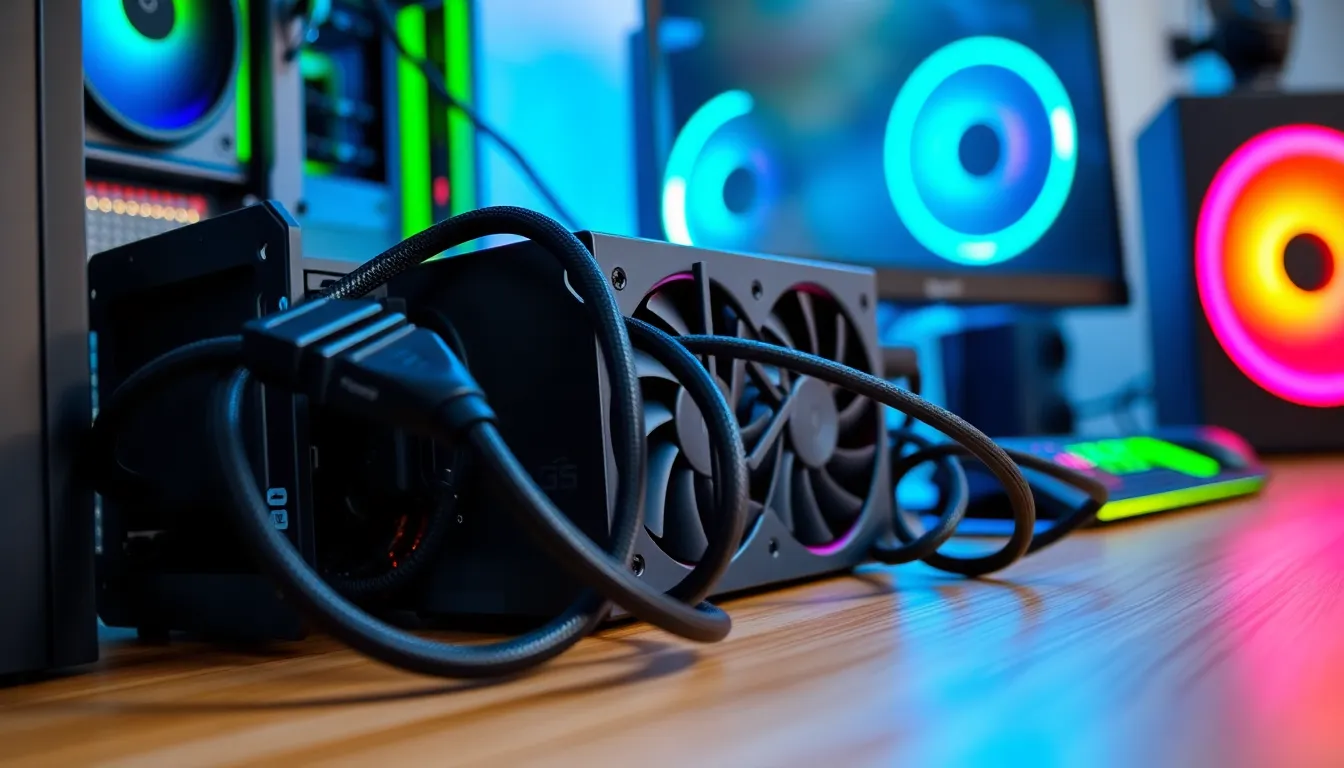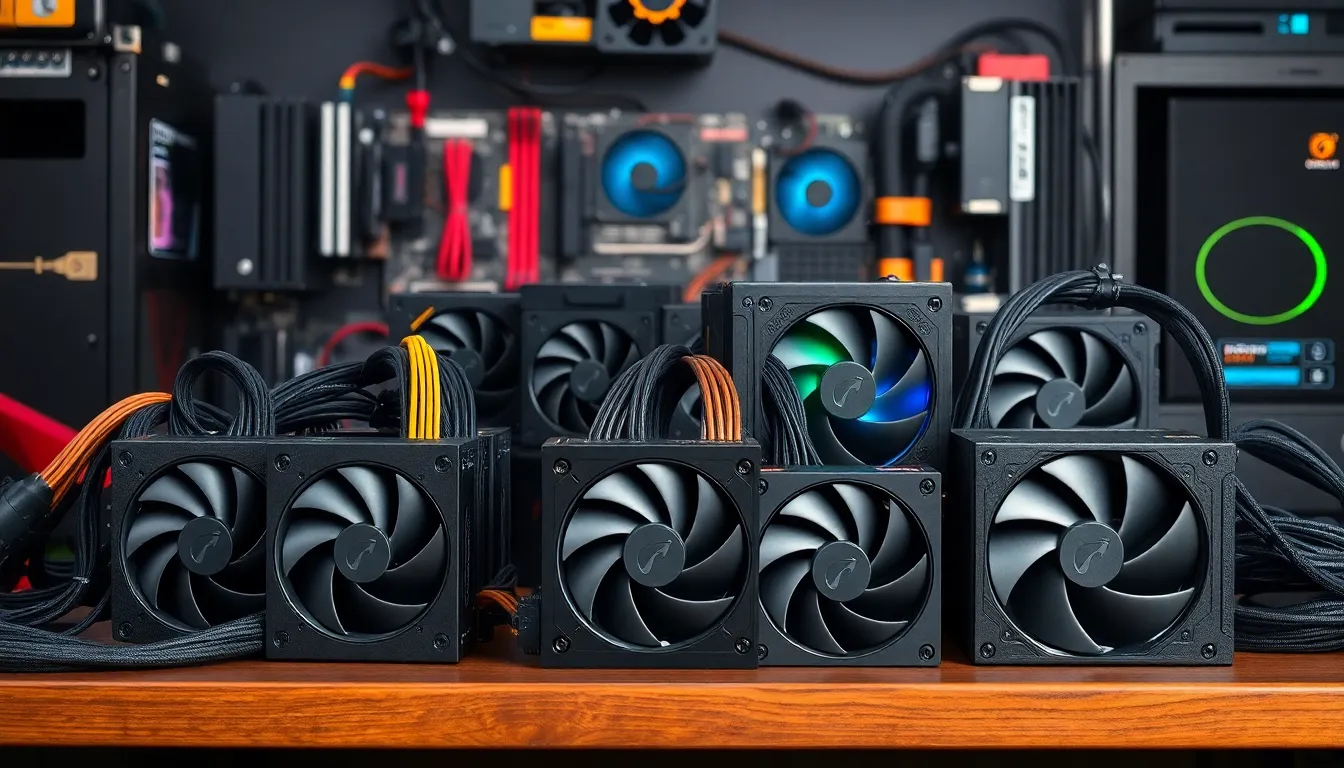When building a gaming PC, every component matters, but few are as crucial as the power supply. Think of it as the unsung hero of your setup, quietly fueling your epic gaming battles while you’re busy slaying dragons or racing through virtual worlds. Without a reliable power supply, even the most powerful graphics card can fall flat faster than a gamer’s hopes of a perfect score.
Choosing the right power supply isn’t just about wattage; it’s about ensuring your rig runs smoothly and efficiently. A good power supply keeps everything stable, preventing those dreaded crashes during the final boss fight. So, let’s dive into the electrifying world of gaming PC power supplies and discover how to power up your gaming experience without frying your components or your wallet.
Gaming PC Power Supply
A gaming PC’s power supply unit (PSU) delivers the necessary electricity to all components. This foundational element transforms electricity from an outlet into usable power for the motherboard, GPU, and other hardware.
What Is a Power Supply Unit (PSU)?
A power supply unit converts alternating current (AC) from the wall into direct current (DC), suitable for computer components. It typically includes connectors for vital components like the CPU and graphics card. The unit’s wattage rating indicates the maximum power it can provide. Finding an appropriate wattage is key; insufficient wattage can lead to system instability.
Importance of a Reliable PSU in Gaming
A reliable PSU crucially impacts system performance during gaming sessions. Stability is maintained more effectively, reducing the risk of crashes or restarts. Quality units prevent potential damage from power surges or fluctuations. Enhanced efficiency often translates to less heat production, enabling quieter operation. Investing in a dependable PSU ensures long-term performance, providing peace of mind during intense gaming experiences.
Types of Power Supplies for Gaming PCs

Various power supplies cater to the needs of gaming PCs. Understanding their differences allows users to select the best option for their setups.
Modular vs Non-Modular Power Supplies
Modular power supplies include detachable cables, allowing users to connect only the necessary cables. This design enhances cable management and airflow within the case. Non-modular power supplies come with fixed cables, resulting in potential clutter and obstructed airflow. Users may find non-modular units simpler to set up but may sacrifice organization. Semi-modular power supplies combine both worlds, offering detachable cables for essential components while maintaining fixed cables for the motherboard and CPU.
Wattage Ratings Explained
Wattage ratings indicate the maximum amount of power a PSU can supply to a gaming PC’s components. Choosing the right wattage is crucial for system stability. For example, components like graphics cards and CPUs have specific wattage requirements that contribute to the overall demand. It’s recommended to select a PSU with a wattage rating that exceeds the total calculated power draw by about 20 percent. This buffer accommodates potential future upgrades and ensures reliability during peak performance demands.
How to Choose the Right Power Supply for Your Gaming PC
Selecting the appropriate power supply unit enhances gaming performance and system reliability. Understanding your power needs and important features plays a crucial role in this choice.
Evaluating Your Power Needs
Start by determining the total wattage required for all components. Calculate wattage from the CPU, GPU, and additional hardware. Online PSU calculators simplify this task, providing accurate estimates based on individual components. Total calculated power draw should then exceed the peak requirements by around 20 percent. This precaution ensures stability during demanding tasks and accommodates future upgrades. Prioritize efficiency ratings, as high ratings often indicate better performance and lower energy costs.
Factors to Consider When Selecting a PSU
Consider efficiency ratings labeled as 80 Plus. Higher certifications like Gold or Platinum signify better performance and less wasted energy. Select between modular types for effective cable management and airflow. Modular options offer flexibility, while non-modular units may clutter setup. Additionally, pay attention to connector types to ensure compatibility with the motherboard and GPU. Quality brands matter for durability and support, so prioritize reputable manufacturers. Finally, check warranty terms that indicate confidence in product reliability and lifespan.
Common Issues with Power Supplies
Power supplies play a vital role in the stability and efficiency of a gaming PC. Several common issues can arise, leading to potential problems during gameplay.
Signs of a Failing Power Supply
Unexpected shutdowns often indicate a power supply issue. System instability can manifest as random crashes, especially during high-performance tasks. Users might observe unusual noises, like buzzing or clicking sounds, which signal internal problems. Additionally, overheating can occur if the PSU struggles to manage power efficiently, leading to thermal failure. Dimming or flickering lights on the case could also suggest dwindling power.
Tips for Maintaining Your Power Supply
Regularly checking power supply connections helps prevent issues. Keeping the PSU clean from dust and obstructions enhances airflow and reduces overheating risks. Users should monitor the system’s temperature to avoid excessive heat buildup. Performing routine inspections for any signs of wear or damage ensures long-term reliability. Staying informed about necessary upgrades assists in maintaining compatibility with evolving hardware requirements.
Conclusion
Choosing the right power supply is vital for any gaming PC build. A quality PSU not only ensures stability and performance but also safeguards the entire system from potential damage. By selecting a power supply that meets or exceeds wattage requirements and prioritizing efficiency ratings, gamers can enjoy a smoother experience.
Investing in a reliable PSU pays off in the long run. It enhances overall performance while reducing noise and heat. Regular maintenance and awareness of common issues can further extend its lifespan. With the right power supply in place, gamers can focus on what truly matters—immersive gameplay and thrilling adventures.

